

Tao Te Ching
Search Sages
Enter all or part of an sage's name or biography in the fields below, then press tab or enter to filter the list of Authors. Click the headings Name or Biography to sort by that column. Diacritics are ignored when searching.
Click on the author's name to go to their page.
| Author Name | Biography |
|---|---|
| John Kennedy | 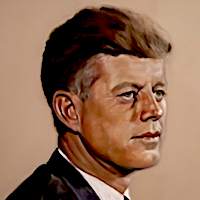 John Kennedy John KennedyModern America's most popular president Journalist, politician, and one of the most respected US presidents of all time; Kennedy inspired a generation and holds the highest presidential average approval rating of 70%—the highest of any president in Gallup's entire history of measuring job approval. He is the only Roman Catholic ever elected president, the youngest person to be elected president, and the second-youngest to serve as president. His book Profiles in Courage, written during his years in the Senate, won a Pulitzer Prize. He established the Peace Corps, supported the civil rights movement, proposed the Civil Rights and the Revenue Acts that were passed after his assassination. He approved the failed Bay of Pigs Invasion but rejected Operation Northwoods, a Joint Chiefs plan to fabricate a false attack to get public support for a war against Cuba as well as successfully navigating the Cuban Missile Crisis. He increased the US presence in Vietnam but—according to Defense Secretary McNama—was strongly considering pulling the US completely out: a position his successor, Lyndon Johnson strongly disagreed with. He began a program called the "New Frontier" to provide federal funding for education, free elderly medical care, aid for poor rural areas, and the ending of racial discrimination; but, these efforts were cut short when he was killed by Lee Harvey Oswald. |
| Abdu’l-Bahá' | 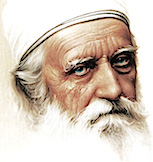 Abdu’l-Bahá' Abdu’l-Bahá'Left in poverty and exile at 8 years old when his father, Bahá'u'lláh (founder of the Bahá'í faith), was imprisoned and all his family’s possessions looted; Abdul Baha grew up in a Palestinian prison colony and after 40 years of imprisonment at age 64 was released giving him the opportunity to more effectively spread these teachings of social service, racial and gender equality, environmental protection and a universal unification of religion, politics, science and government. He was knighted by the British government for his humanitarian work during WWI and today Bahá'í has grown to over 8 million followers, become the world’s fastest growing religion during the last 100 years, the second-most geographically widespread religion after Christianity growing at least twice as fast as the population of almost every UN region. |
| Heraclitus | 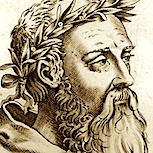 Heraclitus HeraclitusA Greek Buddha Lonely, self-taught wisdom pioneer who like the Buddha abdicated his inherited kingship; Heraclitus also like the Buddha stressed the ever-present quality of impermanence and change, the importance of humans waking up from unconsciousness, and the unity of opposites. Devoted to the principle of inscrutability, he was known as "the Obscure" and wrote only for the wise and not “the rabble.” Born just 28 years after the Buddha, he emphasized the central Buddhist doctrine of impermanence and is famous for his quote, "No man ever steps in the same river twice.” Also contemporary with Lao Tzu, he mirrored the teaching of yin and yang regarding the soul as being a mixture of fire and water, light and dark. |
| Reb Zalman |  Reb Zalman Reb ZalmanMajor founder and proponent of the Jewish Renewal movement and writer of the first English book on Jewish meditation; Rabbi Zalman when young was interned in Vichy French detention camps and escaped the Nazi advance in Europe by coming to America. In 1962 after experimenting with LSD, he left his more conservative tradition and became a voice in the counter-culture movement championing feminism, the Gaia hypothesis, and a kind of mystical pantheism. Recognized as a sheikh (wise elder) by a Sufi order, given an honorary doctorate by a Unitarian school of ministry, and World Wisdom Chair at the Buddhist Naropa University; he was an important voice in deep ecumenical dialogues |
| Simon Bolivar | 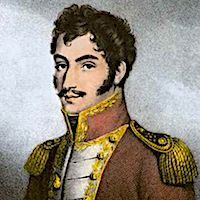 Simon Bolivar Simon BolivarEl Libertador Major image in Latin American identity, military strategy genius, and liberator from Spanish rule of Venezuela, Bolivia, Colombia, Ecuador, Peru, and Panama; Simón Bolívar became the major hero in the 19th century South American independence movements. Inspired by the idealism of the American and French Revolutions, he fought against factions, created foundations for democracy in Latin America, envisioned and worked toward a kind of United States of South America. These efforts however mainly failed, countries devolved into dictatorships, and Bolivar was almost assassinated. He described these attempts at union a failure and only “plowing the sea.” On the other hand, his legacy remains strong with major monuments to him in the capital cities of Lima, Buenos Aires, Havana, México City, Panama City, Paramaribo, San José, Santo Domingo, Sucre, Algiers, Ankara, Bucharest, London, Minsk, Moscow, New Delhi, Ottawa, Paris, Prague, Port-au-Prince, Rome, Tehran, Vienna, and Washington DC. |
| Phryne | 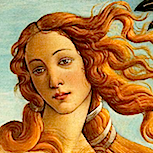 Phryne PhryneModel for the most famous sculptor of the time, Praxiteles and the first life-size statue of the nude female form; Phryne’s habit of letting down her hair and swimming naked in the sea during Elusion festivals inspired Apelles’ famous painting of Aphrodite as well as Botticelli's famous Birth of Venus. Her success as a hetaira courtesan made her so rich she was said to offer funding to rebuild the walls of Thebes destroyed by Alexander the Great if the words "Destroyed by Alexander, restored by Phryne the courtesan" were inscribed on them. Apparently too much to ask, this led to a charge of “impiety” at a trial where she was vindicated and found not guilty after baring her breasts. |
| Saadi Shiraz | 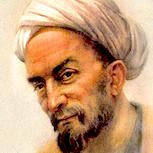 Saadi Shiraz Saadi ShirazOne of the greatest Persian poets and literary influences in medieval times and an influence on the West through people like Goethe, Hegel, Pushkin, and Barack Obama; Saadi - with a Zen-like approach similar to the great Tibetan teacher, Marpa - blended a mystical Sufi realization with a practical traveling merchant lifestyle. Escaping the hardship and poverty of his Baghdad youth, he traveled widely for 30 years including 7 years of imprisonment enslaved to hard labor. He then wandered 20 more years during the Mongol invasions mingling with ordinary people, bandits, refugees, spiritual teachers and farmers translating their experiences into poetry and wisdom teachings. |
| Alhazen | 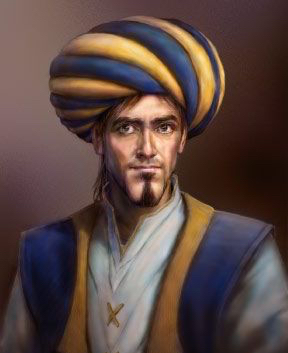 Alhazen AlhazenOne of the most famous and influential Iraqis, philosopher, engineer, astronomer, animal psychologist and one of the first theoretical physicists,; Alhazen understood, used, and promoted the scientific method 200 years before Renaissance scientists. Well-known and honored as "The Physicist" in medieval Europe and writing more than 200 books, he made huge contributions in the fields of optics, astronomy, mathematics, visual perception, and the scientific method. His work on a magnifying lens laid the foundation and inspiration for Roger Bacon and friends’ creation of microscopes and the telescope. He was the first to describe how vision occurs as well as the camera obscura effect on which all photography depends. Apostle of critical thinking and skepticism, he advocated becoming “an enemy of all we read, attacking it from every side.” |
| Will Rogers |  Will Rogers Will RogersOne of the most famous and popular, internationally recognized Native American personalities, "Oklahoma's Favorite Son,” humorist, radio and movie star, columnist, and penetrating social commentator; Will Rogers made 71 movies, traveled around the world 3 times, and wrote more than 4000 national newspaper articles. The highest paid movie star of his time and most respected political commentator, he came from a small farm in Cherokee Nation Indian Territory and set an example for Native Americans integrating into White culture and becoming successful without selling out and abandoning their heritage. Wise, kind, and humorous; he teased politicians, gangsters, and ordinary people’s confused convictions influencing them all into better ways. |
| Rainer Maria Rilke |  Rainer Maria Rilke Rainer Maria RilkeProfound singer of universal music One of the most popular and best-selling poets of all time, a Catholic who believed that Jesus had a baby with Mary Magdalene, secretary to famous sculptor Rodin, lover and confidant of married Sigmund Freud student, psychoanalyst, and Nietzsche’s love focus, Lou Andreas-Salomé; Rilke’s mystical writings are still frequently quoted on TV, in movies, music, and self-help books. Taking art as religion and the only source of human redemption, he reconciled dichotomies like life and death, suffering and joy, beauty and destruction unifying opposites and finding deep meaning is all experience. He described god as nature, life force, and an evolving consciousness only slowly coming into existence. Hermann Hesse wrote that “through him resounds the music of the universe.” |
| Erich Fromm | 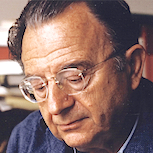 Erich Fromm Erich FrommOne of the most powerful voices of his era promoting the true personal freedom beyond social, political, religious, and national belief systems One of the world’s leading psychoanalyst-philosophers, “forefather of socialist humanism,” civil rights activist, and anti-Vietnam protestor; Fromm was born Jewish, became a rabbi but then came to believe that religion only breeds hatred, inequality, and discord. Becoming another “apostle of doubt,” he criticized political ideologies, cultural convictions, and all authoritarian value systems. Escaping Hitler and the Nazis in Germany, he came to the US where his talks and writings initiated the beginning of political psychology and explored the modern influences toward fascism, irrational behavior, consumerism and the “escape from freedom.” As most of our wisdom holders, he focused on unifying opposites, in particular as in his last book, paradox between “having” and “being.” |
| William Wordsworth |  William Wordsworth William WordsworthOrphaned at an early age, connected with the common man while wandering through Europe on foot, caught up in both the ups and downs of the French Revolution, and Britain's only Poet Laureate who wrote no official verse; Wordsworth defined poetry as "the spontaneous overflow of powerful feelings” and along with Samuel Coleridge, used poems based in common language to help launch the Romantic Age of literature. A student of John "Walking" Stewart who blended yoga and Eastern wisdom from India with western pantheism, he published some of the most influential poetry in Western literature. |
| Avicenna | 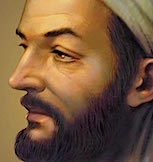 Avicenna AvicennaPersian polymath, spur to the Islamic Golden Age, poet, doctor, scientist, philosopher and one of the most significant thinkers and writers of his time; Avicenna wrote over 450 books one of which became the standard medical text for European universities up until as late as 1650. With influence from Plato and Aristotle, he clarified the distinction between the words and the sense, taught a spiritual path beyond motivations of hope and fear, reconciled the conflict between reason and faith, and his works according to Will Durant, “mark the apex of medieval thought and constitute one of the major syntheses in the history of the mind.” |
| Octavio Paz | 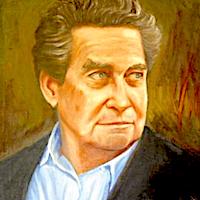 Octavio Paz Octavio PazPersuasive poet and convincing social commentator Poet, diplomat, penetrating social commentator, one of the most important 20th century writers, and one of the greatest Hispanic poets; Octavio Paz dissolved his cultural prejudices and became a true world citizen. After traveling extensively in Asia, Europe, and the USA, he became Mexico’s ambassador to India. He criticized his countrymen as “instinctive nihilists who hide behind masks of solitude and ceremoniousness" and resigned from his Mexican diplomatic service when the government massacred students in 1968. Famous for his remarkable poetry that won a Nobel Prize for Literature, he balanced this kind of writing with influential political commentaries in popular magazines he founded. |
| Yājñavalkya | 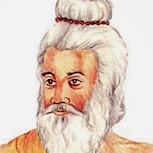 Yājñavalkya YājñavalkyaOne of the earliest non-dual philosophers Revered sage, major figure in the Upanishads, and one of the first philosophers in recorded history; no one could rival Yajnavalkya in debate. Called the greatest theologian of his time, and with his dialogues recorded in the Upanishads, he taught the great philosopher-king of Videha (modern day Nepal), Janaka who created an intellectual center for great sages that became the most important cultural and political center of South Asia. He described an “Absolute Self” and furthered a non-dual school of Hinduism that continues today. In later life he retired in a forest to become a wandering ascetic personifying a tradition popular through the centuries of Indian history. |
| Thomas Hobbes | 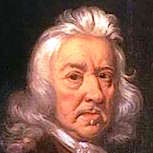 Thomas Hobbes Thomas HobbesSecretary, student, friend to Francis Bacon; Hobbes established the foundation for most modern political philosophy. Formulating social contract theory, he promoted individual rights, natural equality, government based on the will of the people, only representative government as legitimate, and the freedom to do anything that laws don’t forbid. He described human nature as “self-interested cooperation” and introduced mathematical reasoning to the philosophy of science. Though called “the father of totalitarianism” and fixated on peace and order, his radical shift from religion and belief to applying science for understanding human nature helped undermine that same “order” creating more personal, political freedom. |
| Zeno | 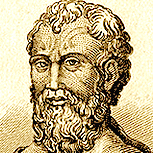 Zeno ZenoSelf-made wealthy merchant, shipwrecked and impoverished Phoenician, founder of Stoicism - a kind of reformation of Epicureanism that had corrupted from the pursuit of happiness to the pursuit of pleasure; Zeno emphasized virtue and goodness as essential to true happiness and peace of mind. An internationalist wanting to break down all national and racial barriers with no nations, classes, rich or poor, he defined vice as the rejection of reason making happiness impossible. Crediting Socrates, he defined the universe as god and acting on hope and fear, seeking pleasure or avoiding pain as the negative impulses causing suffering. His Stoic philosophy remained dominant for c. 800 years, influenced Seneca, Epictetus, and Marcus Aurelius. A major crater on the moon is named after him. |
| Oren Lyons |  Oren Lyons Oren LyonsSeneca and Iroquois Nations Council of Chiefs Faithkeeper, legendary athlete inducted into the Lacrosse Hall of Fame, artist, author, and international peace keeper; Oren Lyons’ life work expanded from promoting his own tribes’ welfare to indigenous lifeways and Native American Rights in general to human rights and economic development for indigenous people all over the world including working for Maori rights in New Zealand, yearly meetings in Geneva for the UN Human Rights Commission, and UNESCO’s World Conference Against Racism. A strong voice for the environment, sustainable development, a more sane world, and for the sacred over materialism; he represents native peoples in many forums throughout the world. |
| Hiawatha | 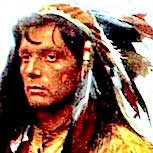 Hiawatha HiawathaShaman, statement, and disciple of Huron prophet and spiritual leader, “The Great Peacemaker” Deganawida; Hiawatha used his charisma and great oratorical skills to spread his teacher’s message of peace and unity bringing together many tribes into the world’s oldest and longest lasting participatory democracy. Deganawida had deep wisdom, vision and spiritual presence but also a severe speech impediment. Like Plato for Socrates, Ashoka for the Buddha, Chuang Tzu for Lao Tzu, Mencius for Confucius, and Paul for Jesus; Hiawatha brought his teacher’s message to the greater world. Gathering the tribal leaders and agreeing on a union, they buried their weapons and on top planted the “Tree of Peace.” |
| Anatole France | 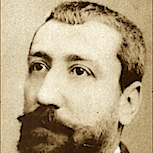 Anatole France Anatole FranceSon of a bookseller and true bibliophile, librarian for the French Senate, and modern lineage holder of Epicurean thought; Anatole France was venomously attacked by Nazi collaborators but defended and admired by George Orwell. His entire set of writings were banned and prohibited by the Roman Catholic Church but in 1921 awarded the Nobel Prize in Literature "in recognition of his brilliant literary achievements, characterized as they are by a nobility of style, a profound human sympathy, and grace.” Journalist, poet, social commentator, historian, playwright, and famous novelist; he became the model for a narrator in Proust's In Search of Lost Time. |